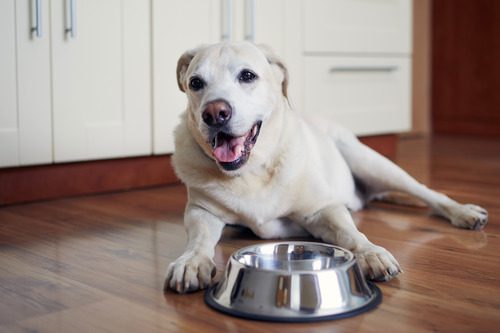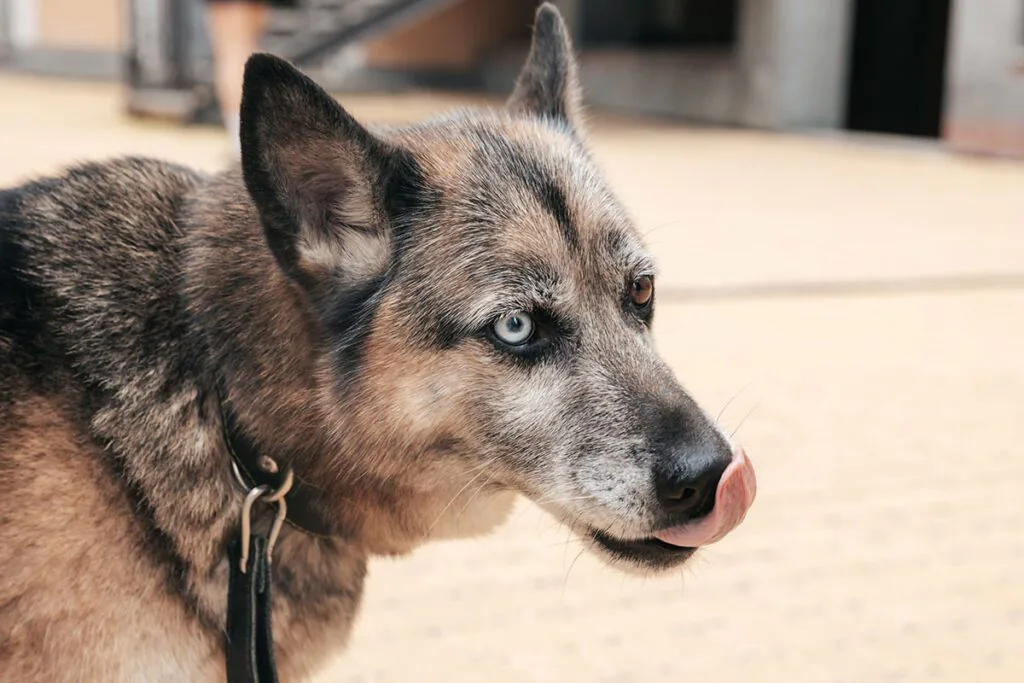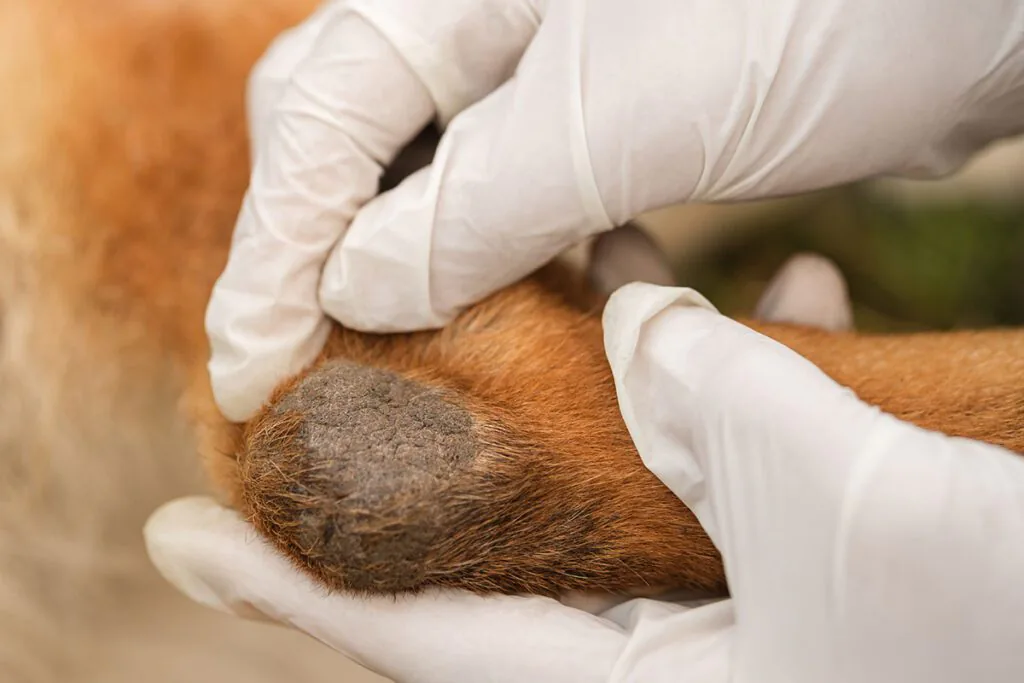Senior Dog Food and Nutrition
As dogs age, their dietary needs begin to shift. Joints may stiffen, digestion can slow, and energy levels often decline—but the right diet can make a meaningful difference in your senior dog’s quality of life. With so many dog food options lining store shelves, it can be challenging to know which formula best supports your dog’s aging body. This blog explores the key factors to consider when selecting senior dog food and how nutrition plays a role in your pet’s overall health. If your dog is entering their golden years, you’ll want to keep reading to learn how diet can support their mobility, digestion, and day-to-day comfort. Our team at Brown Veterinary Hospital can offer you and your senior pet guidance and care tailored to your pet’s individual needs. Call us at (812) 645-0715 or book an appointment online.

When Is a Dog Considered a Senior?
A dog’s transition into their senior years depends on their breed and size. Smaller breeds tend to live longer and may not reach senior status until around age 8 or 9, while large and giant breeds often begin showing signs of aging as early as 5 or 6 years old. During this life stage, your dog may experience a natural decline in metabolism, muscle mass, and immune function. This change in physiology impacts everything from the way your dog processes food to how they burn calories. Recognizing these shifts is the first step toward providing tailored nutrition that meets your senior dog’s evolving needs.
Nutritional Priorities in Senior Dog Food
As dogs age, their dietary requirements shift. Senior dog food is typically formulated with specific nutrients that help support aging bodies. These diets may have fewer calories, more fiber, and additional ingredients to promote joint health, cognitive function, and digestion.
Reduced Calories for Weight Control
Senior dogs tend to slow down, which can lead to unwanted weight gain. Carrying extra weight strains joints and increases the risk of other health issues. Many senior dog food formulas are lower in calories to match a senior dog’s reduced activity level, while still being satisfying and nutritious.
Protein to Maintain Muscle Mass
Although calorie needs may decrease, protein remains essential. Maintaining lean muscle mass is vital for senior dogs to stay strong and mobile. Look for senior dog food with high-quality protein sources such as chicken, fish, or lamb to support muscle maintenance without adding excessive fat.
Fiber for Digestive Support
Older dogs are more prone to constipation and irregular digestion. A fiber-rich diet helps promote gut health and regular bowel movements. Ingredients like beet pulp, brown rice, and pumpkin are often included in senior dog food to support digestive efficiency.
Key Ingredients to Look for in Senior Dog Food
Not all dog food is created equal. Choosing senior dog food with specific ingredients can support your dog’s health in several targeted ways. Let’s break down what to watch for on the label.
Omega-3 Fatty Acids for Joint and Brain Health
Ingredients such as fish oil or flaxseed provide omega-3 fatty acids, which help reduce inflammation, support joint mobility, and may aid cognitive function. This can be especially important for dogs showing early signs of arthritis or age-related cognitive changes.
Antioxidants to Strengthen the Immune System
Antioxidants like vitamins E and C help defend the body against the cellular damage that can come with aging. These nutrients support immune health and may help reduce the risk of chronic conditions over time.
Glucosamine and Chondroitin for Joint Support
If your dog is slowing down on walks or struggling to get up after naps, joint-supporting ingredients like glucosamine and chondroitin may help. These are often included in high-quality senior dog food to support cartilage health and reduce joint discomfort.
How Age Affects Appetite and Eating Habits
It’s common for senior dogs to experience changes in appetite, whether due to dental issues, medication side effects, or decreased smell and taste sensitivity. Adjusting food texture or flavor can make meals more enjoyable and easier to eat.
Soft or Wet Food Options
Dry kibble may be too difficult to chew for dogs with dental issues. Wet or semi-moist senior dog food can be more palatable and gentle on aging teeth. These options can also help with hydration if your dog doesn’t drink water as often.
Palatability Enhancers
Some senior dog food formulas use natural flavor enhancers like chicken broth or liver to encourage eating. If your dog is turning away from meals, this can make a significant difference in getting them the nutrients they need.
How to Transition to Senior Dog Food
Switching to a new dog food should be done gradually over the course of 7–10 days. Begin by mixing a small amount of the new food into your dog’s current diet, slowly increasing the ratio of new to old each day. This slow transition allows your dog’s digestive system to adjust and helps you monitor for any adverse reactions such as vomiting, diarrhea, or food refusal. If your dog doesn’t adjust well, you may need to try a different brand or formula better suited to their preferences or health profile.
Feeding Guidelines and Portion Control
Feeding your senior dog the right amount is just as important as choosing the right formula. Always check the feeding guidelines on the food packaging and adjust according to your dog’s weight, activity level, and health condition.
You may need to split meals into smaller portions throughout the day or include healthy snacks between meals. Avoid overfeeding, as weight gain in senior dogs can quickly lead to joint problems and metabolic concerns.
The Role of Your Veterinarian in Senior Dog Nutrition
Your veterinarian is your best resource for evaluating your dog’s changing nutritional needs. Regular wellness visits, including lab work, can uncover health conditions that may require special diets, such as kidney support or low-fat food for dogs with pancreatitis.
Prescription Diets vs. Commercial Senior Dog Food
Some dogs may benefit from prescription diets, while others do well on high-quality over-the-counter senior formulas. Either way, ongoing guidance from your vet ensures your dog receives the best care based on their health and lifestyle.
Personalized Support at Brown Veterinary Hospital
If you’re unsure which food is right for your aging dog, reach out to the team at Brown Veterinary Hospital. We can provide personalized recommendations based on your pet’s age, size, breed, and medical history. Contact us today to schedule your senior dog’s nutrition checkup.
Supporting Your Dog’s Golden Years Through Diet
The right senior dog food does more than fill your pet’s bowl—it supports their comfort, mobility, and vitality well into their later years. By focusing on balanced nutrition and age-appropriate ingredients, you can help your dog enjoy life to the fullest. Whether your senior pup is slowing down or still chasing tennis balls, their food should match their needs every step of the way. If you have questions about your dog’s current diet or want to discuss a nutrition plan tailored to your pet’s unique needs, Brown Veterinary Hospital is here to help. Call us at 812-645-0715 or book an appointment online to get started.
Recent Posts
About Brown Veterinary Hospital
We are here to serve as your partner in keeping your four-legged family member healthy, ensuring you have all the tools you need to provide them with a lifetime of outstanding care. Our animal hospital in Terre Haute offers a full range of services to nurture and extend your pet’s life, from wellness and preventative care to critical care, exotic pet care, and dermatology.





